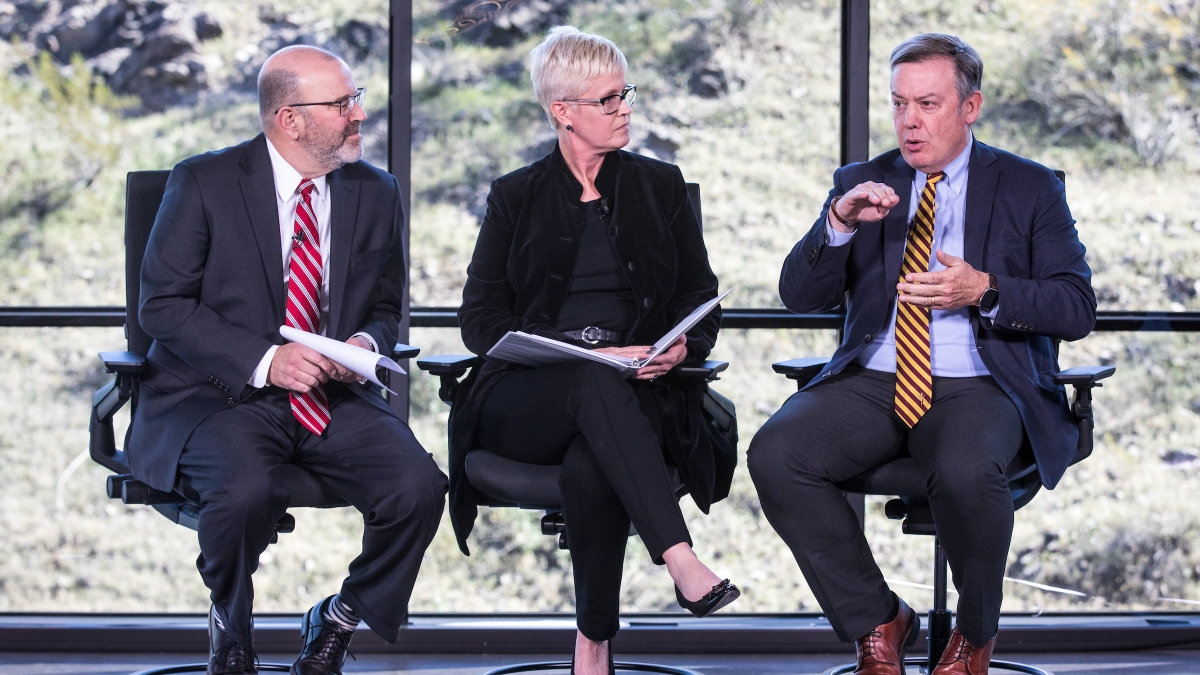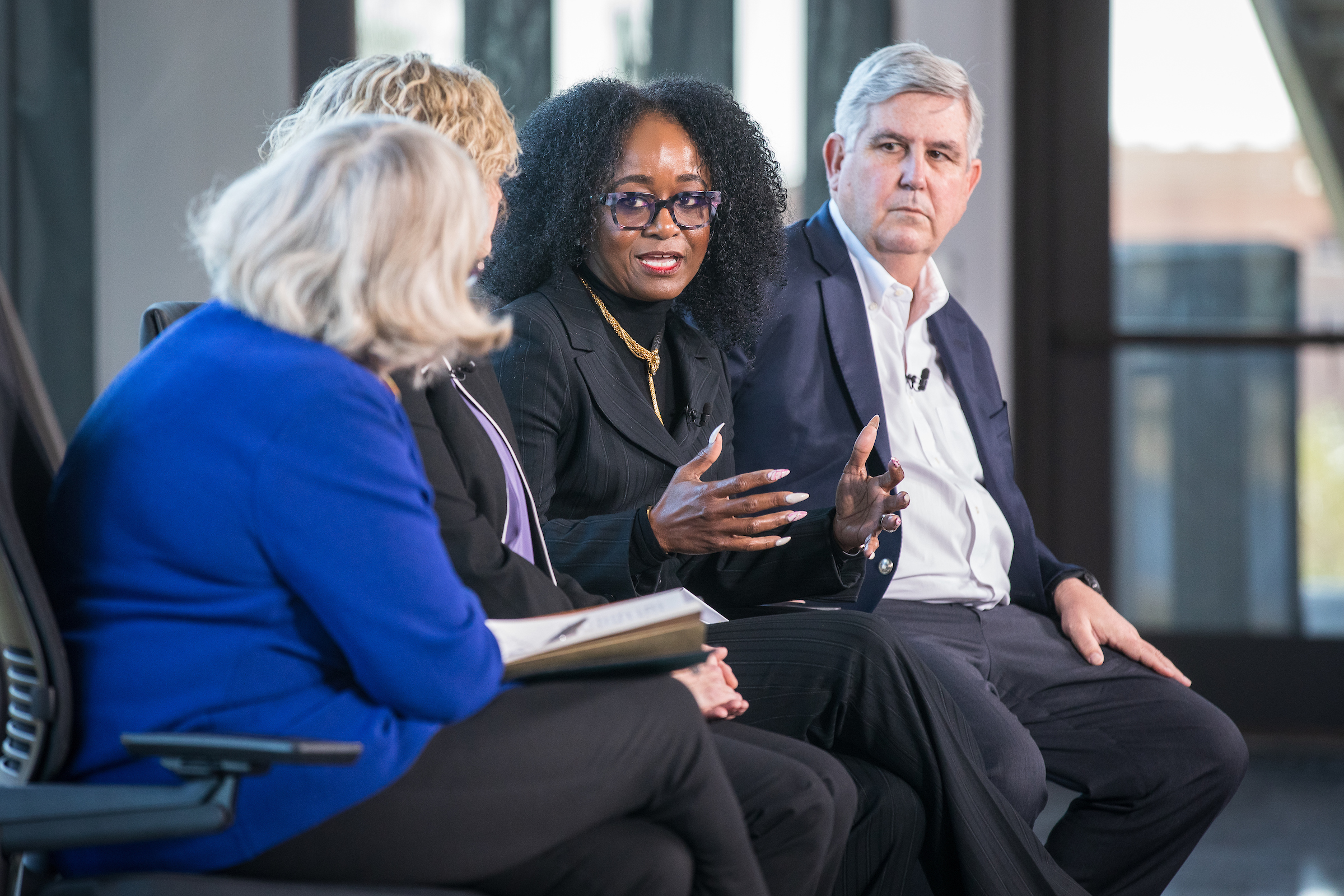State Farm, ASU announce partnership on Pathways for the Future initiative

Editor’s note: This story is being highlighted in ASU Now’s year in review. Read more top stories from 2020.
Arizona State University will prepare learners of all ages to succeed in a transformed workplace thanks to a $30 million gift from State Farm that will fund new programs and scholarships.
The funding, announced Tuesday, will drive the new State Farm Pathways for the Future workforce-development initiative, which will target high school and community college students as well as adults in the workforce who need to update their skills on the go.
"I have a concern that the technological advancements that are occurring in today’s society have the real risk of leaving segments behind," said Michael Tipsord, CEO of State Farm. He spoke at an event announcing the partnership at Sun Devil Stadium on Tuesday.
"You combat that through this continued upskilling of individuals to deal with whatever it is that the world may present. I want our people to have all the opportunities to be able to develop skills and learn in a way that continues to make them relevant and competitive."
State Farm's regional headquarters sits just north of Sun Devil Stadium, and Tipsord said that ASU President Michael Crow was influential in attracting the corporate campus to Tempe. Crow said the partnership is a perfect pairing of two entities that are focused on embracing the future of technology while supporting families and individuals.
"We're excited about this gift and honored to be a partner with State Farm because of the openness and logic with which the gift was approached, which was, ‘How do we now take these resources and not just use them as some generic scholarship,' which is always useful but inadequate," Crow said.
"Here we have a company that’s thinking differently. This investment is looking at each aspect of what we do: Let’s eliminate the financial barrier; let’s build some tools that help us to greatly accelerate who goes to college. It’s not only about money but it’s about ways to overcome barriers."
Pathways for the Future has four components: an online academic program, financial support, tools for success and career coaching.
Participants in the program, called Pathway Scholars, start by earning online credits in one of three tracks: STEM, business leadership, or humanities and social sciences. If a student needs extra help before entering a track, a refresher course or tutoring options will be available. These tracks will lead to an associate degree, undergraduate degree or undergraduate certificate.
One goal of the program is to increase degree completion in Arizona by preparing students to enroll in the Ira A. Fulton Schools of Engineering, the W. P. Carey School of Business, The College of Liberal Arts and Sciences and other units across ASU.
The State Farm gift will allow students to take courses for a reduced cost. For those interested in earning credit, each course will cost $25 for identity verification, to ensure academic integrity, and $400 for credit conversion. Typically, a three-credit online course would cost approximately $1,500. Additionally, students only pay for credit conversion once they are satisfied with their grade and only if they opt to do so.
Other financial incentives will be available, including the State Farm Pathways for the Future Scholarship Program, which will help eligible students pay for enrollment fees, conversion of earned admission credits, tuition and summer bridge programs. Crisis funding will be offered to students when personal emergencies could derail their education.
ASU Vice Provost of Academic Alliances Cheryl Hyman speaks on a panel about preparing students for the future Tuesday at Sun Devil Stadium. She is joined by moderator Jane Oates of WorkingNation; Sarah Mineau, vice president operations, human resources for State Farm; and John Graham of Sun Belt Holdings. Photo by Charlie Leight/ASU Now
The gift also will provide support for students on their academic journey. The longstanding Maricopa to ASU Pathways Program, which serves students who begin at the Maricopa Community Colleges and aspire to transfer to ASU, will be improved with a better progress tracker.
One significant new support will be “Universal Learner me3.” ASU’s online me3 planning tool, which launched several years ago, helps high school and college students discover their career interests through a fun, interactive game. Funding from State Farm will help redesign me3 to reach universal learners, primarily mid-career adults who need to upgrade their skills and community college students. In partnership with State Farm, ASU will develop and pilot the new Universal Learner me3, with the potential for the tool to be expanded into other industries and employment possibilities.
The updated Universal Learner me3 will be part of the new Pathways Career and Transition Success Center, which will ensure that Pathways Scholars are ready to immediately enter or reenter the workforce upon coursework completion. Students will have access to career coaching, digital portfolio and resume preparation and mentorships.
The success center will partner with State Farm and other corporations to keep up with workforce trends and job opportunities and to monitor the need for new credentials or certificates.
Crow said Tuesday that the future of work is changing.
"It’s about the empowerment of the individual," he said. "What we’ll see, if we do this right, is the nature of work and the nature of learning become less differentiated.
"It doesn’t mean you won’t go to college when you’re 18. Some will. Some will go to college when they’re 30, and some will go when they’re 80. Every industry and every sector will be affected by the change, and this investment helps us to accelerate our energy on that issue."
Cheryl Hyman, vice provost for academic alliances at ASU, spoke on a panel at the event, and she described how her career started in the technology industry before she earned an MBA and entered the education field. She said she wished she had been better educated on her career options, and that's why the new Universal Learner me3 is a critical element of Pathways to the Future.
"I've seen thousands of students waste time and money and lose credits and see their financial aid run out, all stemming from a wrong choice that's not their fault," she said.
"We have an obligation to inform every learner of every option they have, and this investment in our transfer tools and me3 allows learners to educate themselves."
Crow said the partnership will have a ripple effect.
"This energy will send a wave. Other companies are listening. Other institutions are listening," he said.
"State Farm is showing not just philanthropy, but activist philanthropy. ... Hopefully, a hundred other groups will step up and do the same thing."
Top photo: State Farm Insurance Chairman and CEO Michael Tipsord (left), moderator and ASU Foundation CEO Gretchen Buhlig and President Michael Crow talk about their alliance to implement the Pathways for the Future program funded by State Farm Education Assist and $30 million, on Tuesday, Feb. 4, 2020, at Sun Devil Stadium. Photo by Charlie Leight/ASU Now
More Arts, humanities and education

‘It all started at ASU’: Football player, theater alum makes the big screen
For filmmaker Ben Fritz, everything is about connection, relationships and overcoming expectations. “It’s about seeing people beyond how they see themselves,” he said. “When you create a space…

Lost languages mean lost cultures
By Alyssa Arns and Kristen LaRue-SandlerWhat if your language disappeared?Over the span of human existence, civilizations have come and gone. For many, the absence of written records means we know…

ASU graduate education programs are again ranked among best
Arizona State University’s Mary Lou Fulton College for Teaching and Learning Innovation continues to be one of the best graduate colleges of education in the United States, according to the…


